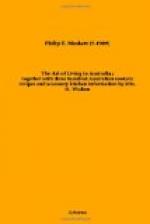It was well known amongst the Greeks and Romans that the muscles reached their greatest state of development by means of exercise. Though, therefore, gymnastics formed a great part of their system of education, yet the chief aim in their athletic instruction was the desire to train men to fight their battles, and in those days war was a matter of personal valour and of individual bravery. On that account, therefore, the men who were selected as their soldiers were among the healthiest of the nation. Those who by reason of bodily infirmity or inherent weakness were unfitted for military prowess were left alone. But, as Maclaren has well pointed out, the object of systematic and proper exercise is not for the production of a race of soldiers, though a certain proportion of the population will always be required for military service. With the great majority of men the struggle for existence is keen, and it is simply a question of the survival of the fittest, and of the weakest going to the wall. The requirements of the present time are therefore a capacity for endurance and an ability to withstand the effects of work day after day. We do not require athletes who are capable of performing wonderful feats of strength; but the fight of the nineteenth century is brain against brain, and he will be best equipped for the struggle who has the advantage of good bodily health. In the higher callings, where brain power is everything, the necessity for perfect physical condition is all the more imperative, because the brain is supplied with healthy blood, and the ideas flow with less effort.
The brain is an organ of the body exactly in the same way that the heart, the lungs, and the liver are, and therefore is subject to the same changes which belong to every other part of the frame. It will be at its best when there is circulating through it a full supply of rich red arterial blood, for that means a continual renewal of fresh material to it, and a speedy removal of worn-out products. It is by exercise mainly, whether it be voluntarily undertaken, or whether it pertain to the calling, that the body is kept at the pink of condition, and the brain benefited accordingly. Another great and important result from improving the bodily health is the increased power of what we call the will. The undertaking, say, of a long walk or climb involves the possession of a certain amount of determination, and many people, though perfectly aware of the good to be obtained by a few hours’ exercise outside the house, have not the determination to carry it into effect. Once the disinclination to move is overcome, the effort required is less each time, and ultimately the will gains a distinct mastery.




